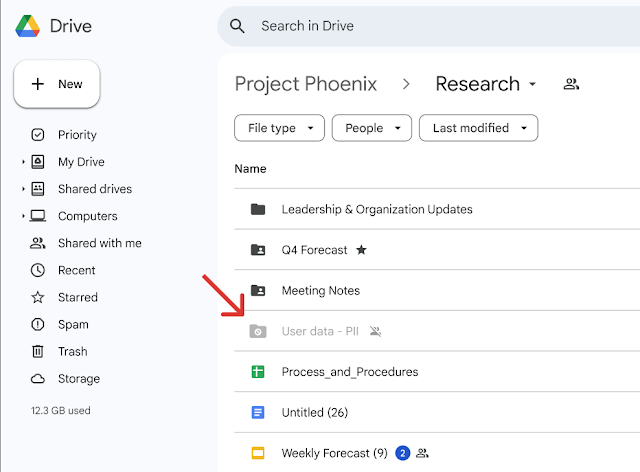What’s changingLast year, we introduced a beta that allows shared drive managers and My Drive owners to restrict folders to specific users. Today, we’re excited to announce the general availability of this feature in shared drives and My Drive, which means that users can restrict access to their My Drive folders using the two options outlined below, and by 2026, we will simplify and align the
restricted access principles for My Drive and shared drives.
Current experience for My Drive folders & files (until February 2026):
Users have two options to restrict access to files or folders in their My Drive:
1. Update item only: Go to your My Drive > choose a file or folder you want to limit access to for a specific user > Change the role of the specific user (e.g. from Commenter to Viewer) > click on "Update item only"
2. Limit folder access: Go to your My Drive > choose the folder you want to limit access > click the overflow menu > share > select share settings in the top right corner > click limit access to “Folder Name”.
For My Drive folders & files after February 2026:
By February 2026, we will stop allowing restricted access on specific files and folders as outlined in option 1 above (update item only), and limited access will be done consistently via the limited access folder setting as outlined in option 2 above (limit folder access). In the future, we will identify all the files and folders that are shared less broadly than their containing folder and enable limited access on them. This will not immediately change who has access to those items, but it will make it so that if someone were to share or unshare the item’s parent later, those changes will not apply to the item with limited access. We will provide an update in early 2026 before this process takes place.
For shared drives:
Only shared drive managers and content managers with sharing access can specify who can open a folder and see what's inside. Everyone else with regular access to the shared drive folder will be able to see that a "sensitive" file or folder exists, and can request access to it. This provides shared drive managers with greater flexibility to keep restricted and unrestricted content within a single shared drive, instead of having multiple folders for different access levels.
Who’s impacted Admins, end users and developers
Why it’s important For My Drive, folders with limited access allow users to control the information viewed by others in their organization. For shared drives, folders with limited access allow users to organize files by project, in a single shared drive or shared folder, while ensuring that sensitive information is only accessible to the right team members.
Additional details Drive’s public API
We’re adding improvements to Drive’s public API that make it easier for developers to adopt the expansive access changes outlined above. Given these updates better align the behavior for items in My Drive and in shared drives, we recommend developers opt in to the expansive access API behavior in My Drive ahead of 2026. Visit this developer guide for more information on
managing folders with limited and expansive access.
“Editors can change permissions and share” setting
As a result of this update, the “Editors can change permissions and share” setting will change by August 2025.
- Turning the setting off will still prevent users with Editor access from sharing the item directly, but if the owner places the item into a shared folder, any changes to the containing folder’s access will be applied on the item. Previously, those changes were only applied if the item’s owner was the one making the folder access change.
- By August 2025, we will apply limited access to items that have this setting turned off. Due to the limited access, the owner will still be the only person who can share those pre-existing items. Limited access will not be applied to items that have the setting turned off after August 2025.
- Admins: Admins need to set up shared drives for their organization in order for end users to access this feature. Visit the Help Center to learn more about folders with limited access.
- End users:
- As a shared drive manager or My Drive folder owner, go to your shared drive or My Drive folder > choose the folder you want to limit access > click the overflow menu > share > select share settings in the top right corner > click limited access to “Folder Name”.
-
Folders with limited access can only be opened by people who have been added to it directly. People with general access to the shared drive or shared folder can see the restricted folder in Drive, but will not be able to open it.
- Folders with limited access are available in both shared drives and My Drive:
- Shared drive managers can always access folders with limited-access
- Folder owners can always access limited-access folders in their My Drive
- For users whose access has been limited, you will see the folder name, but the folder will be grayed out:

- Visit the Help Center to learn more about folders with limited access.
- Developers: Visit the Developer Documentation to learn more about managing folders with limited and expansive access. If you decide to opt into the expansive access API early, your app's behavior will not change when Drive stops allowing restricted access in 2026.
Rollout pace Folders with limited access:
API changes for Expansive Access: - Available to all Google Workspace customers, Workspace Individual Subscribers, and users with personal Google accounts
Resources